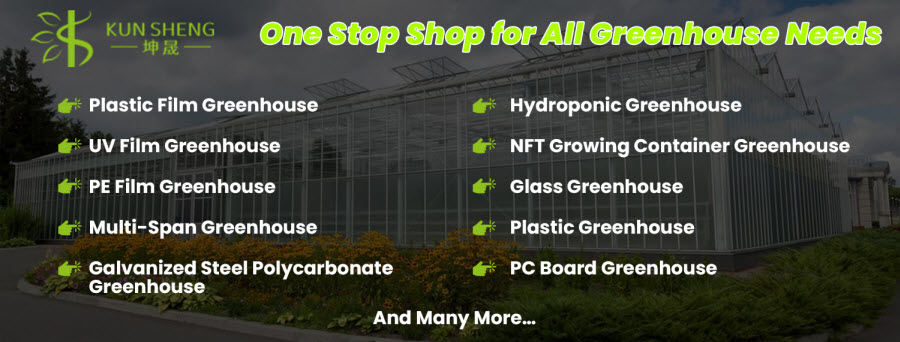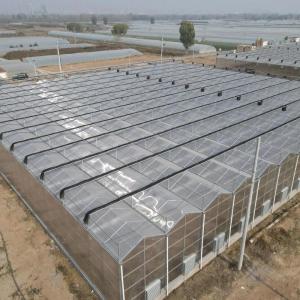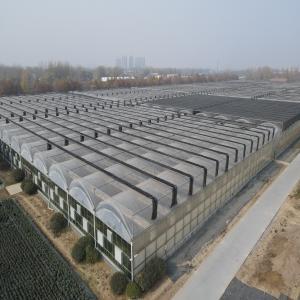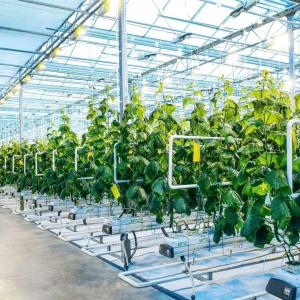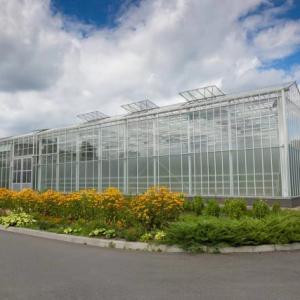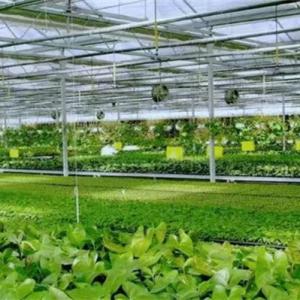Enhancing Kuwait's Agricultural Industry
In this article, we will delve into the growing trend of commercial greenhouses in Kuwait and explore the myriad of opportunities they offer to the agricultural industry. By providing controlled environments, enhancing crop production, and enabling year-round cultivation, these greenhouses have revolutionized the way Kuwaiti farmers approach agriculture. Join us as we uncover the benefits and significance of commercial greenhouses in Kuwait.
Enhancing Kuwait's Agricultural Industry
The utilization of commercial greenhouses has brought about a significant transformation in Kuwait's agricultural industry. With controlled environments, farmers can mitigate the impact of unfavorable weather conditions and create optimal conditions for plant growth. By controlling temperature, humidity, and light exposure, these greenhouses empower farmers to cultivate crops that were once challenging or impossible to grow in Kuwait's natural climate.
Unleashing the Power of Controlled Environments
One of the key advantages of commercial greenhouses is the ability to maintain controlled environments. These structures provide a shield against external factors, safeguarding crops from extreme temperatures, pests, and diseases. By regulating these variables, farmers can optimize growth conditions, resulting in healthier and higher-quality produce. Moreover, the controlled environment minimizes the need for chemical pesticides, making the crops more eco-friendly and healthier for consumption.
Amplifying Crop Production
Commercial greenhouses in Kuwait have revolutionized crop production. By capitalizing on advanced agricultural technologies, such as hydroponics and vertical farming, farmers can maximize space utilization and crop yields. These innovative techniques enable the cultivation of multiple crops in a smaller footprint compared to traditional farming methods. With increased crop production, Kuwait can address the growing demand for fresh, locally grown produce, reducing reliance on imports.
Embracing Year-Round Cultivation
In Kuwait, where extreme weather conditions pose a challenge to year-round cultivation, commercial greenhouses offer a viable solution. These structures provide a stable environment that allows farmers to extend the growing season beyond the natural limitations. By leveraging climate control systems and artificial lighting, farmers can cultivate crops throughout the year, ensuring a consistent supply and reducing dependence on seasonal cycles. This not only ensures food security but also opens up new possibilities for farmers to explore diverse crop varieties.
Commercial greenhouses have emerged as a game-changer for Kuwait's agricultural industry. By harnessing the power of controlled environments, farmers can overcome natural limitations and boost crop production. With the ability to cultivate crops year-round, Kuwait can reduce its dependence on imports and enhance food security. As the popularity of commercial greenhouses continues to rise, the agricultural industry in Kuwait is poised for sustainable growth and economic prosperity.
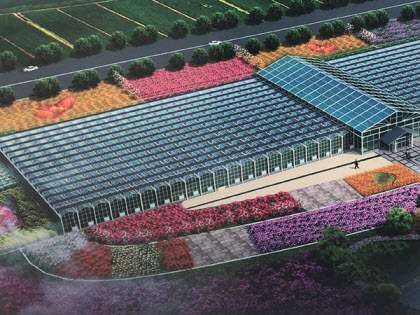
Rising Demand for Fresh Produce in Kuwait
Locally Grown, Pesticide-Free Delights: The New Consumer Preference
As the demand for fresh produce continues to surge in Kuwait, consumers are increasingly leaning towards locally grown, pesticide-free vegetables and fruits. This shift in preference can be attributed to the growing awareness of the health benefits associated with consuming organic produce. By tapping into this emerging trend, businesses can cater to the evolving needs of health-conscious consumers.
Commercial Greenhouses: Nurturing the Cravings for Freshness
In order to meet the year-round demand for fresh and high-quality produce in Kuwait, commercial greenhouses play a pivotal role. These modern marvels of agriculture create an ideal environment for cultivating a wide variety of fruits and vegetables, irrespective of seasonal limitations. By harnessing advanced technologies and climate control systems, commercial greenhouses ensure optimal growth conditions, resulting in robust and flavorful crops.
Bridging the Gap: The Benefits of Commercial Greenhouses
Commercial greenhouses offer numerous advantages that help bridge the gap between demand and supply in the Kuwaiti market. Firstly, they provide a reliable source of fresh produce, reducing the dependency on imports and enhancing food security. Secondly, by eliminating the need for pesticides, these controlled environments ensure the delivery of healthy and safe food options. Moreover, commercial greenhouses promote sustainable farming practices by optimizing resource utilization and minimizing waste generation.
A Blossoming Industry: The Future of Commercial Greenhouses in Kuwait
The future of commercial greenhouses in Kuwait looks promising as the demand for fresh produce continues to grow. With advancements in technology and increased awareness of environmental sustainability, these innovative farming methods are poised to thrive. The local government's support and incentives further contribute to the expansion of the greenhouse industry, creating opportunities for entrepreneurs and investors to capitalize on this flourishing market.
In conclusion, the escalating demand for fresh produce in Kuwait has sparked a shift towards locally grown, pesticide-free options. Commercial greenhouses emerge as the solution to meet this demand by ensuring a year-round supply of high-quality produce. By embracing this trend and capitalizing on the benefits offered by commercial greenhouses, businesses can tap into a flourishing market and contribute to Kuwait's sustainable food ecosystem.
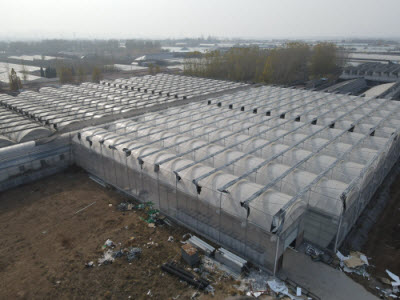
Advantages of Commercial Greenhouses in Kuwait
1. Precise Environmental Control for Optimal Growth
Commercial greenhouses in Kuwait offer precise control over environmental factors, such as temperature, humidity, and light. By utilizing advanced technologies, growers can create optimal growing conditions for various plant species. This control allows farmers to adjust the environment to meet specific plant requirements, resulting in enhanced growth and productivity.
2. Protection against Pests, Diseases, and Weather Conditions
Greenhouses provide a protective shield against pests, diseases, and harsh weather conditions. These structures act as physical barriers, preventing the entry of harmful organisms and pests. With proper monitoring and integrated pest management systems, the risk of infestations and disease outbreaks is significantly reduced. Moreover, commercial greenhouses shield crops from extreme weather events, ensuring stable and consistent growth.
In Kuwait's unique climate, commercial greenhouses offer unparalleled advantages, providing a controlled and secure environment for plant cultivation. Growers can maximize productivity while minimizing risks, ultimately contributing to the success of the agricultural industry in the region.
Innovative Technologies in Commercial Greenhouses
Advanced Irrigation Systems: Maximizing Water Efficiency for Sustainable Farming PracticesThis section focuses on the role of advanced irrigation systems in commercial greenhouses in Kuwait. These cutting-edge systems optimize water usage and promote sustainable farming practices. By incorporating precision irrigation techniques, such as drip irrigation and hydroponics, farmers can reduce water wastage while ensuring optimal hydration for crops. We'll discuss the benefits of these innovative irrigation systems, including improved resource management and enhanced crop yields.
Automated Climate Control: Achieving Optimal Growing Conditions for Increased Productivity
In this section, we'll explore how automated climate control systems revolutionize commercial greenhouse operations in Kuwait. These advanced technologies utilize sensors, actuators, and computer algorithms to monitor and regulate temperature, humidity, and ventilation levels. By maintaining optimal growing conditions, farmers can promote healthy plant growth and maximize productivity. We'll discuss the various components of automated climate control systems, their benefits in terms of energy efficiency and crop quality, and their contribution to sustainable farming practices.
Smart Monitoring Devices: Enhancing Efficiency and Resource Management
This section focuses on the utilization of smart monitoring devices in commercial greenhouses in Kuwait. These innovative technologies enable real-time monitoring and analysis of crucial parameters such as temperature, humidity, soil moisture, and CO2 levels. By gathering and analyzing this data, farmers can make informed decisions to optimize resource usage and enhance operational efficiency. We'll explore the features and benefits of smart monitoring devices, including remote accessibility, data-driven decision-making, and their role in promoting sustainable farming practices.
Driving Sustainable Farming: Innovations for Maximizing Crop Yields
In this section, we'll delve into how innovative technologies in commercial greenhouses contribute to maximizing crop yields in Kuwait. We'll discuss how the integration of advanced irrigation systems, automated climate control, and smart monitoring devices collectively optimize plant growth and ensure high-quality yields. By adopting these technologies, farmers can reduce the environmental impact of their operations while increasing productivity. We'll emphasize the importance of sustainable farming practices and highlight the positive outcomes achieved through the adoption of these innovative technologies.
By incorporating these advanced technologies into commercial greenhouse operations in Kuwait, farmers can revolutionize their farming practices. The utilization of advanced irrigation systems, automated climate control, and smart monitoring devices not only enhances resource management but also contributes to sustainable farming and increased productivity. With continuous advancements in greenhouse technology, the future of commercial farming in Kuwait looks promising and environmentally responsible.
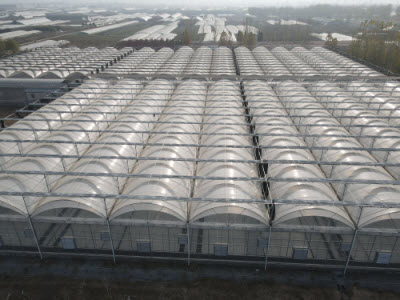
Government Support and Initiatives for Commercial Greenhouses in Kuwait
Promoting Green Growth: Government Support for Commercial Greenhouses in Kuwait
Kuwait's government has taken significant steps to support and promote the development of commercial greenhouses in the country. With the aim of fostering a sustainable agricultural sector, the government has implemented various subsidies, grants, and favorable policies to encourage investments in greenhouse farming. These initiatives demonstrate Kuwait's commitment to ensuring food security and reducing dependency on imports.
Subsidies and Grants: Boosting Investments in Commercial Greenhouses
To incentivize investments in commercial greenhouses, the Kuwaiti government provides a range of subsidies and grants. These financial incentives aim to offset the initial costs associated with establishing and operating greenhouse facilities. Through these subsidies, investors can receive financial assistance for infrastructure development, such as construction, irrigation systems, and energy-efficient technologies. Additionally, grants are available to support research and development efforts, enabling growers to enhance their productivity and optimize their greenhouse operations.
Favorable Policies: Creating an Enabling Environment for Greenhouse Farming
Kuwait's government has implemented several favorable policies to create an enabling environment for greenhouse farming. These policies aim to streamline licensing and permit procedures, reduce bureaucratic hurdles, and provide regulatory frameworks that facilitate the establishment and operation of commercial greenhouses. By reducing administrative barriers, the government encourages more entrepreneurs and investors to venture into greenhouse farming, thereby stimulating the growth of the agricultural sector.
Investments in the Agricultural Sector: Diversification and Sustainability
Recognizing the importance of a diversified economy, Kuwait's government has placed significant emphasis on the agricultural sector. Investments in commercial greenhouses play a crucial role in achieving this diversification, as they contribute to the country's overall food production and reduce reliance on imports. By supporting greenhouse farming, the government aims to enhance domestic agricultural capabilities and improve self-sufficiency in food production. These investments are aligned with Kuwait's long-term vision for sustainable development and economic growth.
Public-Private Partnerships: Collaborating for Greenhouse Farming Advancements
The government of Kuwait actively encourages partnerships between the public and private sectors to promote greenhouse farming advancements. By collaborating with private entities, the government seeks to leverage their expertise, resources, and technological innovations to drive the growth of commercial greenhouses. These partnerships facilitate knowledge sharing, research and development, and the implementation of best practices in greenhouse farming. By working together, the government and private entities can create a robust and sustainable agricultural sector in Kuwait.
In conclusion, the government of Kuwait is committed to supporting and promoting the development of commercial greenhouses in the country. Through subsidies, grants, favorable policies, and partnerships with the private sector, the government aims to create an enabling environment for greenhouse farming and boost investments in the agricultural sector. These initiatives are essential for achieving sustainable and diversified economic growth while ensuring food security for the nation.
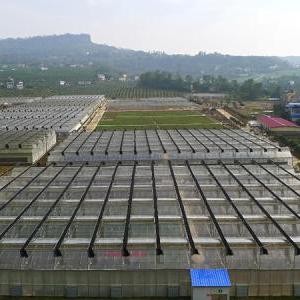
Emerging Trends of Commercial Greenhouses in Kuwait
Optimizing Space and Resource Utilization with Vertical Farming
In the evolving landscape of commercial greenhouses in Kuwait, vertical farming has emerged as a revolutionary technique. This method allows for the cultivation of crops in vertically stacked layers, maximizing the use of available space. By implementing vertical farming, commercial greenhouses in Kuwait can significantly increase their production capacity while reducing the land footprint. The utilization of vertical farming techniques not only ensures optimal space utilization but also enables efficient resource management, leading to enhanced productivity and profitability.
Enhancing Efficiency through Hydroponics and Aquaponics
Hydroponics and aquaponics are gaining popularity as innovative cultivation methods in Kuwait's commercial greenhouses. With hydroponics, plants are grown in a nutrient-rich water solution, eliminating the need for soil. Aquaponics, on the other hand, combines hydroponics with aquaculture, creating a symbiotic system where fish waste provides essential nutrients for plant growth. By adopting these techniques, commercial greenhouses in Kuwait can achieve higher crop yields, reduced water consumption, and improved overall efficiency. Hydroponics and aquaponics offer sustainable and environmentally friendly solutions for agricultural production.
Harnessing Renewable Energy Sources for Sustainable Greenhouses
The integration of renewable energy sources is a significant trend in Kuwait's commercial greenhouses. Solar panels and wind turbines are increasingly being installed to generate clean energy, reducing reliance on conventional power sources. This shift towards renewable energy not only helps in minimizing greenhouse gas emissions but also lowers operational costs. By harnessing solar and wind energy, commercial greenhouses in Kuwait can achieve sustainable and eco-friendly operations while ensuring a consistent and reliable power supply for their agricultural activities.
Leveraging AI-Driven Systems for Efficient Monitoring and Decision-Making
In the era of digital transformation, commercial greenhouses in Kuwait are leveraging AI-driven systems for monitoring and decision-making processes. Advanced sensors and IoT technologies are used to collect real-time data on environmental conditions such as temperature, humidity, and light levels. This data is then analyzed by AI algorithms to optimize greenhouse operations, including irrigation, ventilation, and pest control. By implementing AI-driven systems, commercial greenhouses can achieve precise and automated control, leading to increased crop quality, reduced resource wastage, and improved overall productivity.
To stay ahead in the rapidly evolving landscape of commercial greenhouses, it is crucial for businesses in Kuwait to embrace these emerging trends. By adopting vertical farming, hydroponics, and aquaponics, optimizing space and resource utilization becomes achievable. Integrating renewable energy sources ensures sustainability and cost-efficiency, while AI-driven systems empower efficient monitoring and decision-making processes. Embracing these trends will enable commercial greenhouses in Kuwait to thrive in the competitive agricultural industry.
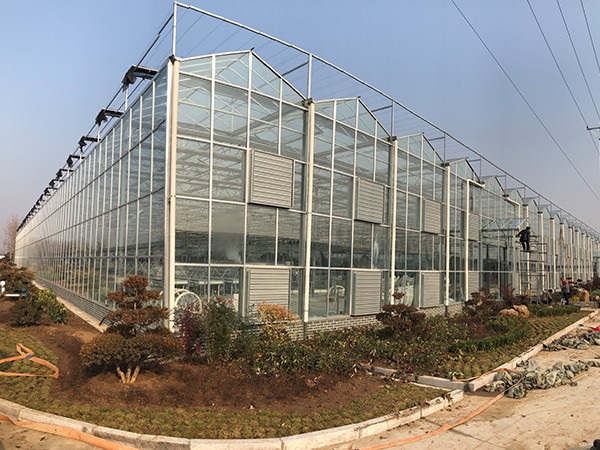
Exploring Entrepreneurial Opportunities in Commercial Greenhouses
Commercial greenhouses in Kuwait present exciting opportunities for entrepreneurs to expand their operations, create sustainable businesses, and meet the growing demand for fresh produce. This section will discuss the potential for local farmers to leverage these greenhouses and tap into the market for organic herbs, specialty crops, and export opportunities to neighboring countries.
Tapping into the Growing Demand for Fresh Produce
Entrepreneurs can capitalize on the increasing consumer demand for fresh produce by utilizing commercial greenhouses. With a controlled environment, these greenhouses enable year-round cultivation of fruits, vegetables, and herbs that are known for their freshness and nutritional value. Meeting the demand for high-quality, locally sourced produce can be a lucrative opportunity for entrepreneurs.
Expanding Local Farmers' Operations
Commercial greenhouses offer local farmers a chance to expand their agricultural activities beyond traditional limitations. By utilizing these controlled environments, farmers can overcome challenges such as limited arable land and seasonal variations. This expansion allows entrepreneurs to increase productivity, cultivate a wider range of crops, and contribute to the region's food security.
Creating Sustainable Businesses
Entrepreneurs can establish sustainable businesses by embracing commercial greenhouses. These greenhouses provide an opportunity to optimize resource utilization, reduce water consumption, and minimize the use of pesticides. By implementing eco-friendly practices, entrepreneurs not only contribute to environmental preservation but also cater to the growing consumer demand for sustainable and environmentally conscious products.
Leveraging Value-Added Products: Organic Herbs and Specialty Crops
Entrepreneurs can explore the production of value-added products within commercial greenhouses, such as organic herbs and specialty crops. The controlled environment ensures the cultivation of high-quality, flavorful herbs free from harmful chemicals. Additionally, the cultivation of unique specialty crops allows entrepreneurs to cater to niche markets and discerning customers, differentiating themselves in the market and commanding premium prices.
Expanding Market Reach: Export Opportunities to Neighboring Countries
The strategic location of Kuwait and well-established trade routes create export opportunities for entrepreneurs operating in commercial greenhouses. By establishing reliable supply chains and adhering to international standards, entrepreneurs can tap into neighboring markets, meet the demand for locally grown crops, and expand their customer base. Exporting agricultural products can significantly contribute to the growth and success of their businesses.
In conclusion, commercial greenhouses in Kuwait offer abundant entrepreneurial opportunities for local farmers and aspiring entrepreneurs. By tapping into the growing demand for fresh produce, expanding operations, creating sustainable businesses, leveraging value-added products, and exploring export avenues, entrepreneurs can thrive in the realm of commercial greenhouse farming.
